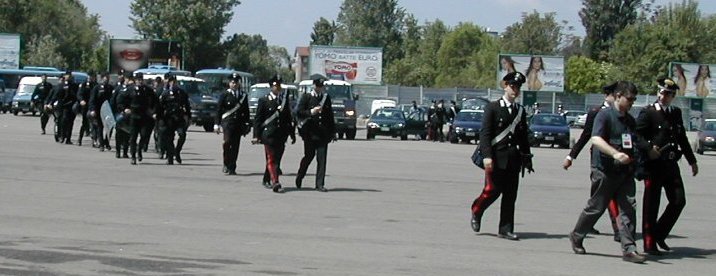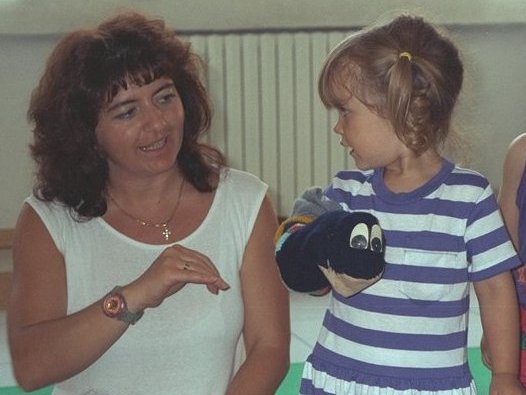^ carabinieri arriving for a soccer match at Milan’s San Siro stadium
I used to believe that spectator sports were a way of channeling the mob’s inherent violence into vicarious forms of conflict. “Supporting” a team means joining a sort of artificial tribe, comprised of that team’s fans. You signal your membership in the tribe by wearing the team colors, chanting the team chant, and despising rival tribes. The teams on the field play out a ritualized battle in which one side wins and the other loses, with more or less actual violence and possibility of injury, depending on the sport.
Unfortunately, nowadays the tribes no longer leave the battle to the teams on the field. While in England for my MBA residential school, I had time one evening to do my usual hotel thing: flipping channels on the TV. One program showed a town’s preparations for a football (soccer) match. A trainload of fans were met at the station by mounted police in riot gear – even the horses had plastic shields over their eyes. The crowd was escorted off the train, with mounted police leading, and more walking alongside. The road from the station to the arena was lined on both sides with police, standing shoulder to shoulder in flourescent yellow jackets; the visiting fans had to walk straight along the road to the arena.
Inside the arena, a police chief remarked to the TV crew that there were 100 seats unsold for the match, so they would be able to create a buffer zone between the opposing fans. I didn’t stay with the program to see what happened, but later on saw footage of rowdy fans (faces electronically blotched out) being dragged away by police.
Some games in Milan involve similar preparations: busloads of police arrive well before the match begins, and are presumably dispersed throughout the stadium to maintain order. For games when certain nationalities of foreign fans are expected, the mayor orders all bars nearby not to serve beer after a certain time.
If I were a housebreaker, crime boss, etc., I’d be delighted to know that I could get on with my trade in peace during football games, when the bulk of a city’s police force are busy keeping the fans from killing each other.
However, I am only a taxpayer, wondering how much all this is costing me. Is football worth the cost to society, even for those who care about the sport? A few years ago, in an effort to curb stadium violence, the then-minister of sport in Italy threatened to have the games played in empty stadiums, viewable only on TV. How is it “sport” when we must go to such lengths to prevent the audience getting hurt?
The whole concept of “supporting a team” seems very artificial to me. I can understand rooting for one’s national team during the Olympics or the World Cup – at least you have a passport in common with them, and perhaps a language, culture, and history (although the increasing phenomenon of athletes migrating, to countries where they can be better supported for an Olympic bid, or get a spot on a less-exalted team, calls that into question). In a sense, you are cheering your country’s ability to produce good players – there are worse national traits to celebrate.
But it’s rare for a “local” professional football team to have a single player from the city that they supposedly represent – many of the players won’t even be from the same country. So, when we cheer for AC Milan, what are we applauding? Berlusconi’s ability to buy good players? Given the mysteries shrouding the origin of his personal fortune, this is not something that makes me cheerful. Still less do I feel that football is worth getting violent about, unless maybe I could beat up Berlusconi.
Feb 9, 2003
I wrote the above a few days ago, inspired by the TV show I saw in the UK. Today Milan’s two home teams, AC Milan and Inter, are playing each other in Milan’s famous San Siro stadium. We saw six large buses and assorted other vehicles full of police heading that way. Then, as we entered the metro station at Piazzale Lotto (closest stop to the stadium), we were suddenly confronted with several dozen riot-geared police. We had had the ill luck and bad timing to arrive just as a subway train pulled in, carrying fans of both teams. To avoid trouble, they had been put into separate cars, with police escort. The police cordoned off the station so that one group was forced to wait while the other group exited, each side singing rude songs and shouting slogans at the others. The rowdies were, predictably, young men, but the groups included women, and some confused and frightened looking children. The rest of us stood and waited until both packs of idiots had left the station.












